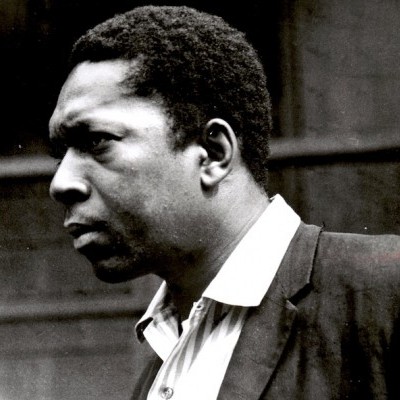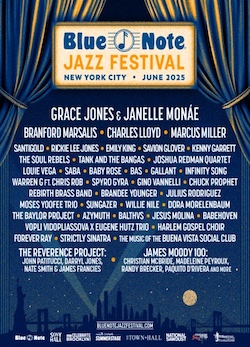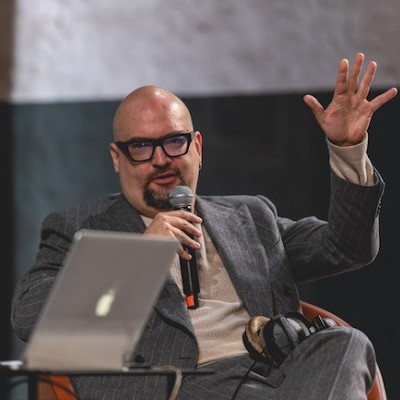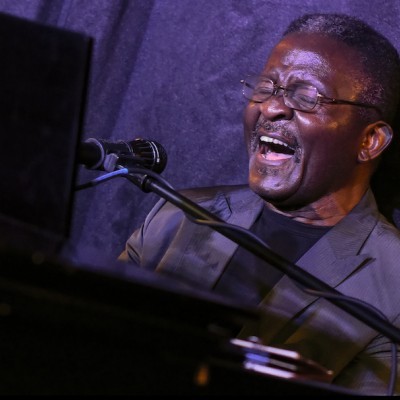Mar 18, 2025 3:00 PM
A Love Supreme at 60: Thoughts on Coltrane’s Masterwork
In his original liner notes to A Love Supreme, John Coltrane wrote: “Yes, it is true — ‘seek and ye shall…

The title of Christian Sands’ album Be Water nods to a quote by martial arts star Bruce Lee.
(Photo: Anna Webber)Despite its disparate parts, the album coalesces around the theme of flexibility but without assaulting the listener with the high concept behind it. Most provocatively, the program includes the ambitious track “Be Water II,” which gracefully merges a piano trio with a highly textured string quartet, performing an arrangement written by Sands’ former MSM peer Miho Hazama.
“I wrote it as a piano sonata for students to practice movement,” Sands explained. “I’m a big fan of Mozart, and I’ve always loved certain things about his music, like his arpeggios. So, I was playing this piece, trying to figure out what to do for this next album, and I was like, ‘Can I put a string quartet on there?’ A lot of things I come up with are from the question of why. I decided to just keep it there and further it along, and Miho immediately came to mind.”
For Hazama, there’s irony in having her old friend turn to her for the kind of string arrangements in a jazz setting that has become her calling card: She credits Sands with determining her career path.
“He was a year behind me at MSM,” Hazama said. “When I got to New York, I still had plans to become a jazz pianist, rather than just a composer and arranger. But then I heard him play—just jamming before classes one day. His technique and groove were so phenomenal, and his playing was so organic that he made me rethink my plans. I knew, given my background as a classical pianist in Japan, that I could never achieve that.”
Among the elements that made Hazama recognize Sands as not just another young keyboard hotshot with loads of technique was his ability to draw color from the piano.
“A lot of jazz players just work on their technique and don’t focus on tone, but he gets that,” she said. “I used to have my ‘dream sound’ in my head and be able to play it in the classical setting. He plays that dream sound, those tone colors. It’s sophisticated and sexy. He has a very strong core in his body, so he can use less power in his playing yet draw out these very thick notes.”
Aside from his playing, Hazama also remembers being impressed with Sands’ outlook at MSM.
“He was always reaching out to classical students to learn specific things,” she said. “That’s such a wonderful attitude as an artist.”
“Most jazz musicians, especially when they’re young, are musical tourists,” said Sanabria, who was one of Sands’ mentors at MSM. “They look at things at a superficial level. They think they can learn a style of music like Afro-Cuban by just learning patterns. Christian got involved in the culture. He didn’t want to be a tourist. He wasn’t on an ego trip; he was very poised, polished and enthusiastic, which I think is a reflection of his work with Dr. Billy Taylor.”
Like Hazama, Sanabria recalled first hearing Sands at MSM, and his own reaction.
“He was assigned to my Afro-Cuban Jazz Orchestra,” Sanabria said. “At the first rehearsal, I heard these young guys, and said to myself, ‘Holy shit.’ Right then was when I decided to do those albums with them. I got him the Tito Puente Scholarship to study with Sonny Bravo, one of the true giants of Latin music, and he was able to really get inside that heavily percussive style of playing, as well as being able to play bebop with a really fast, light touch.”
If there’s an overarching motif to Sands’ career to this point, it’s his ability to astound listeners when they first hear him. Strickland is no exception.
“We were on a [bassist] Ben Williams gig together about five years ago, and the first thing I noticed was how young he looked,” Strickland said. “I was like, ‘Man, this guy looks like a baby,’ but he played like a grown man. It was very impressive to see someone his age have so much knowledge, and I’ve seen him grow so much since then.”

“This is one of the great gifts that Coltrane gave us — he gave us a key to the cosmos in this recording,” says John McLaughlin.
Mar 18, 2025 3:00 PM
In his original liner notes to A Love Supreme, John Coltrane wrote: “Yes, it is true — ‘seek and ye shall…

The Blue Note Jazz Festival New York kicks off May 27 with a James Moody 100th Birthday Celebration at Sony Hall.
Apr 8, 2025 1:23 PM
Blue Note Entertainment Group has unveiled the lineup for the 14th annual Blue Note Jazz Festival New York, featuring…

“I’m certainly influenced by Geri Allen,” said Iverson, during a live Blindfold Test at the 31st Umbria Jazz Winter festival.
Apr 15, 2025 11:44 AM
Between last Christmas and New Year’s Eve, Ethan Iverson performed as part of the 31st Umbria Jazz Winter festival in…

“At the end of the day, once you’ve run out of differences, we’re left with similarities,” Collier says. “Cultural differences are mitigated through 12 notes.”
Apr 15, 2025 11:55 AM
DownBeat has a long association with the Midwest Clinic International Band and Orchestra Conference, the premiere…

“It kind of slows down, but it’s still kind of productive in a way, because you have something that you can be inspired by,” Andy Bey said on a 2019 episode of NPR Jazz Night in America, when he was 80. “The music is always inspiring.”
Apr 29, 2025 11:53 AM
Singer Andy Bey, who illuminated the jazz scene for five decades with a four-octave range that encompassed a bellowing…